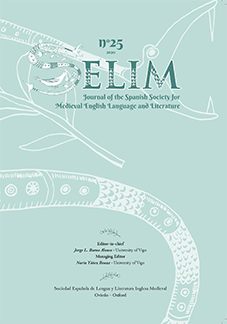Abstract
The purpose of this paper is to compare two 15th-century manuscripts, Cambridge, University Library Kk.1.3 and Oxford, Bodleian Library Hatton 50, focusing on both paleographical and linguistic aspects. Samples from different sections of both manuscripts have been transcribed from either the original manuscripts or digital photographic reproductions. Each word and morpheme have been lexico-grammatically tagged to evaluate the scribe’s linguistic behaviour with respect to spelling, phonology, and morphology. Paleographical and linguistic data to support the two main conclusions of the study are offered. With this analysis, I conclude that both manuscripts are, almost certainly, copied by the same person. Comparison of the different copying strategies generated by this single scribe allows us to achieve a better understanding of the written material in which Middle English has been preserved.References
MANUSCRIPT SOURCES
Ann Arbor, University of Michigan, Hatcher Library, 225
Cambridge, University Library Kk.1.3 (parts 10 and 11)
London, British Library Harley 1337
London, British Library Harley 6251
Manchester, John Rylands Library English 63
Northumberland, Alnwick Castle 455
Oxford, Bodleian Library, Hatton 50
Oxford, Bodleian Library, Rawlinson C. 901
Oxford, Bodleian Library, Tanner 11
Oxford, St John’s College 57
Philadelphia, Rosenbach Museum and Library 1084/2
Princeton, Firestone Library 100
SECONDARY SOURCES
Benskin, M. & M. Laing 1981: Translations and Mischsprachen in Middle English Manuscripts. In M. Benskin & M. L. Samuels eds. So Meny People Longages and Tonges: Philological Essays in Scots and Mediaeval English Presented to Angus McIntosh. Edinburgh, Middle English Dialect Project: 55–106.
Carrillo-Linares, M. J. & K. Williamson 2019: A Reconsideration of the Dialectal Provenance of the Prick of Conscience in Oxford, St John’s College, 57. Anglia 137.2: 303–350.
Carrillo-Linares, M. J. & K. Williamson 2020: The Linguistic Character of Manuscripts Attributed to the So-called ‘Beryn Scribe’: A Comparative Study. In L. Wright ed. The Multiple Origins of Standard English. Berlin & New York, Mouton de Gruyter: 87–139.
Christianson, C. P. 1989: Evidence for the Study of London’s Late Medieval Manuscript-Book Trade. In J. Griffiths & D. Pearsall eds. Book Production and Publishing in Britain, 1375–1475. Cambridge, Cambridge University Press: 87–108.
e-LALME: An Electronic Version of A Linguistic Atlas of Late Mediaeval English. 2013: M. Benskin, M. Laing, V. Karaiskos & K. Williamson. Edinburgh, The University of Edinburgh. http://www.lel.ed.ac.uk/ihd/elalme/elalme.html. [Accessed from September 2013 to June 2020]
Horobin, S. 2009: The Edmund-Fremund Scribe Copying Chaucer. Journal of the Early Book Society 12: 193–203.
Horobin, S. & L. R. Mooney 2004: A ‘Piers Plowman’ Manuscript by the Hengwrt/Ellesmere Scribe and its Implications for London Standard English. Studies in the Age of Chaucer 26: 65–112.
Laing, M. 2000: The Linguistic Stratification of the Middle English Texts in Oxford, Bodleain Library, Ms Digby 86. Neuphilologische Mitteilungen 101.4: 523–569.
LALME: A Linguistic Atlas of Late Medieval English. 1986: A. McIntosh, M. L. Samuels & M. Benskin [with the assistance of M. Laing and K. Williamson]. Aberdeen, Aberdeen University Press.
McIntosh, A. 1974: Towards an Inventory of Middle English Scribes. Neuphilologische
Mitteilungen 75: 602–624. [Reprinted in M. Laing ed. 1989: Middle English Dialectology: Essays on Some Principles and Problems. Aberdeen, Aberdeen University Press: 46–63.]
Matheson, L. 1998: Prose Brut: The Development of a Middle English Chronicle. Tempe (Arizona), Medieval and Renaissance Texts and Studies, 180.
Mooney, L. R. 2006: Chaucer’s Scribe. Speculum 81.1: 97–138.
Mooney, L. R. & L. Matheson 2003: The Beryn Scribe and his Texts: Evidence for Multiple-Copy Production of Manuscripts in Fifteenth-Century England. The Library 4.4: 347–370.
Mooney, L. R., S. Horobin & E. Stubbs. Late Medieval English Scribes https://www.medievalscribes.com. ISBN 978-0-9557876-6-9.
Mosser, D. 2010. The Paper Stocks of the Beryn Scribe. Journal of the Early Book Society for the Study of Manuscripts and Printing History 13: 63–93.
Mosser, D. & L. R. Mooney 2014: More Manuscripts by the Beryn Scribe and his Cohort. The Chaucer Review 49.1: 39–76.
Mosser, D. & L. R. Mooney 2016: The Case of the Hooked-g Scribe(s) and the Production of Middle English Literature, c. 1460 – c. 1490. Chaucer Review 51: 131– 150.
Samuels, M. L. 1981: Spelling and Dialect in the Late and Post-Middle English Periods. In M. Benskin & M. L. Samuels eds. So Meny People Longages and Tonges: Philological Essays in Scots and Mediaeval English Presented to Angus McIntosh. Edinburgh, Middle English Dialect Project: 43–54.
Summary Catalogue, Vol 2, Part II. 1937: H. H. E. Craster & N. Denholm-Young.
Summary Catalogue of Western Manuscripts in the Bodleian Library at Oxford, Vol 2, part II (Collections and Miscellaneous Mss Acquired during the Second Half of the 17th Century), not. 3491–8716. Oxford, Clarendon Press.
Taylor, A. 2003: Manual to Miscellany: Stages in the Commercial Copying of Vernacular Literature in England. The Yearbook of English Studies 33: 1–17.
Warner, L. 2018: Chaucer’s Scribes. London Textual Production, 1384–1432. Cambridge, Cambridge University Press.




